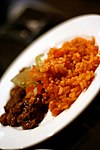


Frijoles negros (lit. 'black beans' in Spanish) is a Latin American dish made with black beans, prepared in Guatemala, Cuba, Venezuela (where it is called caraotas negras), Puerto Rico, Mexico, and other nations in Latin America. The black bean, a legume of the species Phaseolus vulgaris, is usually purchased in either canned or dried form. One cup of dried black beans yields approximately 2+1⁄2 cups of cooked beans. Black bean soup (sopa de frijoles negros) is another commonly prepared Cuban favorite.
Frijoles negros is typically seasoned with salt, ham hocks, onions and garlic, tomatoes, powdered cumin seeds, oregano and vinegar.
Nutrition[edit]
Black beans are high in folate (256 μg), iron (3.61 mg), magnesium (120 mg), and phosphorus (241 mg); they are also a source of zinc (1.92 mg), niacin (2 mg), and thiamine (0.42 mg)—based on 1 cup portion size. Black beans are very high in soluble fiber.[1][2][3]
Glycemic response[edit]
The glycemic response is not well understood. Black beans have a low glycemic index. Black beans lessen the effects of other foods that have rank very high on the glycemic index.[4]
See also[edit]
References[edit]
- ^ "UMass Medical School - Worcester". University of Massachusetts Medical School. February 25, 2014. Archived from the original on December 5, 2020. Retrieved November 27, 2020.
- ^ "Black Beans". Men's Health. January 9, 2015. Archived from the original on November 27, 2020. Retrieved November 27, 2020.
- ^ "Nutrition Facts for Black Beans". myfooddata. Archived from the original on 2020-12-06. Retrieved 2020-11-27.
- ^ Winham, Donna M.; Hutchins, Andrea M.; Thompson, Sharon V. (4 October 2017). "Glycemic Response to Black Beans and Chickpeas as Part of a Rice Meal: A Randomized Cross-Over Trial". Nutrients. 9 (10): 1095. doi:10.3390/nu9101095. PMC 5691712. PMID 28976933.











